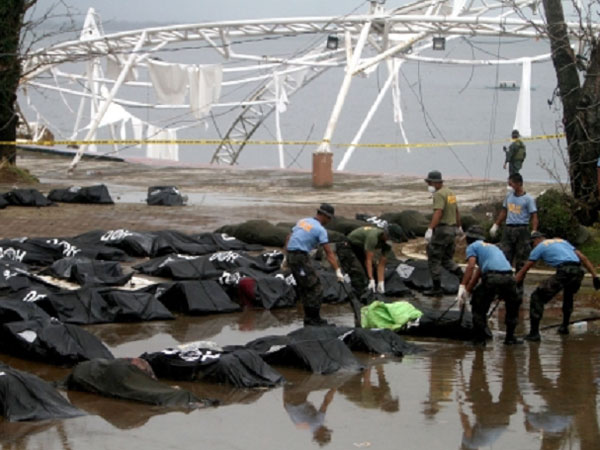Disorganized mass burials of ‘Yolanda’ fatalities hit
MANILA, Philippines – Hasty and disorganized mass burials of bodies in areas hit by Typhoon Yolanda (international name Haiyan) would only add to the trauma of surviving relatives and may cause legal problems, the International Committee of the Red Cross (ICRC) said Wednesday.
“There are certain procedures that should be followed to preserve the dignity of the victims and facilitate their identification,” Andres Patino, ICRC expert in humanitarian forensic action said in a statement.
“The dead should be properly collected and placed in temporary burial places, to allow for forensic investigation later. Photographs should be taken, and any descriptive information and post-mortem data should be recorded,” he said.
The first several days after “Yolanda” barrelled through the provinces and cities in the Visayas region, bodies were left scattered on the roads.
Survivors complained that the decomposing bodies were fouling up the air and increasing the risk of an outbreak of diseases.
Article continues after this advertisementTecson Lim, Tacloban City Administrator, had told reporters in Tacloban that due to sanitation and health concerns, authorities in some towns were left with no choice but to conduct mass burials when cadavers remained uncollected after several days.
Article continues after this advertisementMore than 4,000 have been reported killed, according to the report of the National Disaster Risk Reduction and Management Council Wednesday.
ICRC however said that since the victims died from a natural calamity, it would not cause an epidemic.
“There is no public health justification for rapid mass burials. Contrary to what many people believe, the bodies of those who die in a natural disaster do not cause epidemics, and they are a negligible health hazard,” ICRC said in its statement.
“It is probable that most victims of Typhoon [Yolanda] died of injury, drowning or fire; they are not likely to have had epidemic-causing diseases such as cholera, typhoid, malaria or the plague when they died,” it said.
The only possible health risk would come from drinking water that has been contaminated by a decomposing body. This could be easily avoided by disinfecting or boiling the water to kill any water-borne diseases such as diarrhea, ICRC said.
“Hasty and uncoordinated burials of the dead without proper identification are a concern for the authorities and the ICRC, as they can be very painful for the bereaved,” it said.
“Improper and undignified management of the dead can traumatize families and communities, and may have serious legal consequences, as it may be impossible to recover and identify the remains later. The victims will simply be missing,” ICRC added.
The identification of the remains of victims is important for relatives to be able to mourn, Nancy Fournier, a member of the ICRC delegation in Manila, said.
“Families with no information on the whereabouts of loved ones are grief-stricken. Giving them the possibility to identify their missing relative – even dead – is crucial,” she said.
“They need to know what happened to be able to start mourning. That’s why it is so important to handle remains carefully,” she added.
Related stories
‘Yolanda’ revives compensation row at UN climate talks
Del Rosario: ‘Yolanda’ a sign of climate change
Human activity driving climate change–leaked report
Pinoy youth urged: Fast for climate change pact
